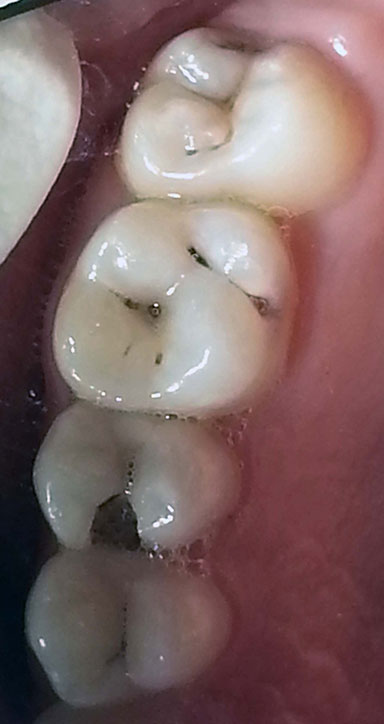
According to studies, the bacteria that cause cavities can be transmitted from one person to another. Sugar, candies, and sweets are usually blamed for rotten teeth, but the real culprits are bacteria, called Streptococcus mutans, which are contagious. Just as a cold virus can be passed from one person to the next, so can these cavity-causing bacteria. They feed on food particles left in your mouth, and the acid they produce eats away teeth. The bacteria/bugs travel easily from person to person.
These bacteria can spread from mouth to mouth via shared food and utensils, sneezing, kissing, and more. Kissing between couples can also cause the spread of harmful bacteria. Research has shown many patients, who have clean, healthy mouths, discover a couple of cavities after entering into a relationship with a partner who has cavities, gum disease or hasn’t been to the dentist in several years. As an adult, you’re less susceptible to bacteria spread than children because they haven’t built up immunity yet.
A 2007 study conducted at the University of Queensland’s School of Dentistry in Australia found that cavity-causing bacteria was found in the mouths of 30% of 3-month-old babies, 60 percent of 6-month-olds, and more than 80% of 24-month-olds with primary teeth. Most common way bacteria is transferred to infants and children is mom putting the pacifier in their mouth when they want to “clean” it and then put it in their child’s mouth. Another very common way is by tasting the food themselves to make sure it’s not hot before feeding their child, or using the same spoon that mom ate from. This could also be the babysitter or any other person that is taking care of your baby.
How to prevent transferring bacteria from adult to child:
- No sharing food or utensils
- If there is not a way to wash the pacifier, don’t use your mouth to do so
- Do not kiss your baby/child on the lips
- Clean your baby’s gums with a wet gauze
- Once they have teeth, use a small baby toothbrush to brush their teeth
- Teach your child that there is no sharing food or utensils with other kids
- Teach your kids that there is no kissing on the play ground
- Avoid giving kids sugary juices, especially at bed time
- Power toothbrushes: Until children are about the age of eight they don’t have the manual dexterity to brush all of the plaque off by themselves.
- Sealants: Prevent four out of five cavities in children under the age of 15. Sealants are clear resin protective coatings for the chewing surfaces of your children’s teeth. Dentists usually start applying sealant as the permanent teeth start coming in but in especially cavity-prone kids, dentists are beginning to apply sealants to the children’s primary (baby) teeth to stop the chain of dental disease even earlier.
- You as a parent need to brush and floss regularly
- You need to keep your regular check up and cleanings every 6 months
Tips in preventing spread of cavity and gum infection as an adult:
- Good home care: brushing and flossing
- Go to your dentist for regular check up and cleanings
- Make sure your partner does not have cavities or gum disease
- Chew sugar-free gum between meals
How can your dentist help?
First, your dentist can make sure your mouth is free of decay and infection. After that, there are a couple of preventive measures that are especially effective in preventing against these bacteria:
Antimicrobial rinses: A prescription rinse like Chlorhexidine can permanently or as the researchers like to put it, fatally, disrupt the cell membrane of these bacteria, reducing the levels in your mouth and preventing transmission to your child or partner.
Flouride application: Every 6 months your dentist can apply flouride on your teeth for protection
Sealants: Usually applied on the chewing surfaces of permanent molars.
Xylitol: This is a non-cavity causing sugar substitute found in some chewing gums that makes it almost impossible for Strep mutans to adhere and cause trouble. However, there isn’t enough xylitol in gum yet but many companies are trying to get FDA approval for the full strength gum.
By Ladan Zinati

4rvc504 Teeth Whitening - Guitar Forum DailyGuitar.com
June 21, 2012[…] Go and see this good website: Teeth Whitening […]
admin
June 23, 2012It is really cool..thank you for spending your time a little bit:)
admin
July 24, 2012Very nice. Thanks a lot!!!
How To Prevent Cavities? | All Weightloss
August 25, 2012[…] 1993. You can visit my website to learn more about my office and my team, and also learn more about dental cavities and gum disease Posted in weightloss | Tagged diet, lose weight, weight loss, […]
How To Prevent Cavities? | My Blog
August 25, 2012[…] 1993. You can visit my website to learn more about my office and my team, and also learn more about dental cavities and gum disease Category: Uncategorized […]